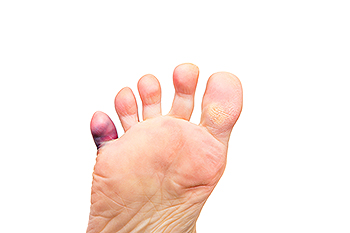(517) 487-5171
Fax (517) 908-0172
What is a Tailor’s Bunion?
Tuesday, 26 March 2024 00:00
Tailor's bunions, also known as bunionettes, are bony protrusions that develop on the outside of the foot at the base of the little toe. Similar to traditional bunions, they can cause pain, inflammation, redness, and difficulty wearing certain shoes. Tailor's bunions are often caused by pressure and friction, leading to the misalignment of the fifth metatarsal bone and the little toe. The discomfort and limitations caused by tailor's bunions can significantly impact one's quality of life, especially in terms of footwear choices and mobility. Simple activities such as walking or standing can become painful and challenging. If you have such a bunion and it is causing severe pain, it is suggested that you make an appointment with a podiatrist for interventions that can help.
If you are suffering from bunions, contact Dr. Gary Cesar of Michigan Foot and Ankle Center. Our doctor can provide the care you need to keep you pain-free and on your feet.
What Is a Bunion?
A bunion is formed of swollen tissue or an enlargement of boney growth, usually located at the base joint of the toe that connects to the foot. The swelling occurs due to the bones in the big toe shifting inward, which impacts the other toes of the foot. This causes the area around the base of the big toe to become inflamed and painful.
Why Do Bunions Form?
Genetics – Susceptibility to bunions are often hereditary
Stress on the feet – Poorly fitted and uncomfortable footwear that places stress on feet, such as heels, can worsen existing bunions
How Are Bunions Diagnosed?
Doctors often perform two tests – blood tests and x-rays – when trying to diagnose bunions, especially in the early stages of development. Blood tests help determine if the foot pain is being caused by something else, such as arthritis, while x-rays provide a clear picture of your bone structure to your doctor.
How Are Bunions Treated?
- Refrain from wearing heels or similar shoes that cause discomfort
- Select wider shoes that can provide more comfort and reduce pain
- Anti-inflammatory and pain management drugs
- Orthotics or foot inserts
- Surgery
If you have any questions, please feel free to contact our offices located in Lansing and Mt. Pleasant, MI . We offer the newest diagnostic and treatment technologies for all your foot care needs.








